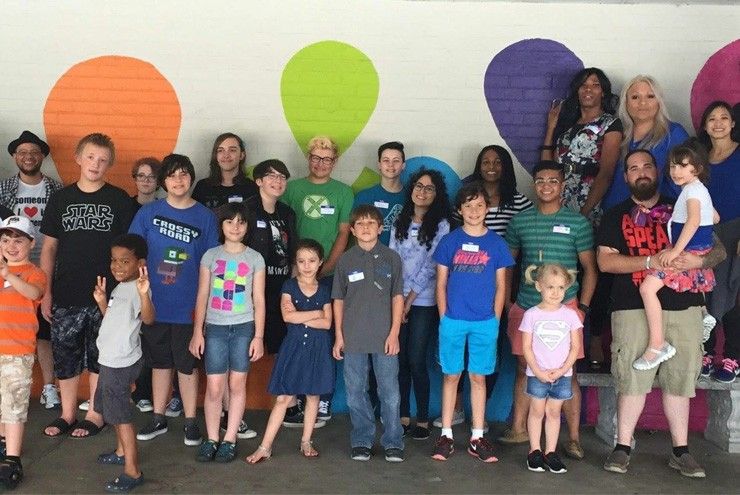Dr. Laura McGuire
In the summer of 2016, I was just getting my feet wet as the University of Houston’s first-ever sexual violence prevention and education program manager. While looking for ways to incorporate my activism and background in LGBTQ inclusion into my new role, a colleague suggested I look into Gender Infinity—an upcoming conference that serves as a gender affirming space for transgender and gender expansive people and their families, learners, advocates, providers, and educators.
I was immediately intrigued and reached out to Gender Infinity co-founder Colt Keo-Meier, one of the warmest and kindest people I have ever met. I submitted a proposal on inclusion for health educators and medical providers and was accepted. My session went wonderfully, and seeing my students interact with other young people about their gender expansive journeys was simply incredible.
Now in its seventh year, the conference returns to the University of Houston on October 13 and 14. I recently had the pleasure of chatting with Colt and his spouse and fellow Gender Infinity co-founder, Becca, on the upcoming conference, their activism, and the future of gender.
Dr. Laura McGuire: Welcome Colt and Becca! Thank you so much for agreeing to talk with us. Can you tell me a bit about yourselves and Gender Infinity?
Becca Keo-Meier: Thank you for having us! My sexuality and gender are queer and I use any or no pronouns. I am a PhD student at the University of Houston Graduate College of Social Work with a research interest in anti-transgender bias and advancing the wellbeing of trans and gender expansive people. Appointed by Mayor Sylvester Turner, I serve on Houston’s inaugural LGBTQ advisory board alongside incredible community changemakers. I am also a coordinator of the Gender Infinity conference, a program of Gender Infinity, a Houston-based organization that promotes connection, knowledge, and resources for trans and gender expansive individuals and their families, providers, and advocates. Our seventh annual conference will be October 13 and 14 at the University of Houston and I am very excited about this year’s programming. Gender Infinity works collectively to facilitate more gender affirming relationships, spaces, and approaches to care. As a co-founder of Gender Infinity, I envision a world that not only affirms, but also celebrates infinite gender possibilities.
Colt Keo-Meier: I’m a queer trans guy and clinical psychologist specializing in gender and sexual health. As a psychologist, I work as a clinician, researcher, and educator. I’m currently in medical school at UTMB in Galveston with the goal of becoming a family medicine physician. I intend to serve our community as both a psychologist and primary care physician. I am also a co-founder of Gender Infinity and work with Becca on coordinating the conference.
How do you see homophobia/transphobia still present in your professional fields?
Colt Keo-Meier: I am in my second year of medical school and have not received any education on the health of LGBTQ people—the population I will be seeing the most in my future practice. We, as queer and trans people, have not been mentioned except when students lead ally trainings. This erasure is especially disturbing in light of the immense health disparities experienced by our population, as well as the unique barriers to healthcare we experience.
In psychology graduate school, I did receive about one to two hours worth of instruction related to LGBTQ people by outside lecturers. However, most of the faculty were unaware of the unique experiences and needs of LGBTQ people.
For me, it comes down to the pervasive lack of education in my fields—it sends a clear message that the health of LGBTQ people is not important (an idea that stems from LGBTQ negativity). The lack of training leads to millions of professionals who are unprepared to serve our community—a community that experiences a multitude of health disparities.
We are fortunate to be a part of a movement that is working to increase provider education. When people know better, they can do better. I tell groups that I am training, “What you don’t know can harm your patient.” Since we’ve taken an oath to do no harm, it is our obligation, as providers, to take steps to seek out the education that we need to discontinue the harm to LGBTQ people.
Check out #transhealthfail for examples of how trans people are being failed by the medical community on a daily basis. We hope the Gender Infinity conference will offer education and resources that will address barriers to care for trans and gender expansive people.
Becca Keo-Meier: We live in a society permeated with certain expectations about sexuality and gender that lead to heterosexist and cissexist assumptions in practice, policy, and research. I am proud to be a steward of the social work code of ethics, which charges us with responsibilities to eliminate discrimination, oppression, and other forms of social injustice among groups—including those adversely impacted by homophobia and transphobia. However, like many professional fields, anti-LGBTQ attitudes remain present in social work. These attitudes may surface as subtle, often unintentional forms of aggressions, known as microagressions, which reinforce barriers to affirming care for LGBTQ individuals in mental health, healthcare, housing, and education. Research suggests that, while many social workers are interested in working with transgender people, most do not feel equipped. I hope to help shift social work education toward a more gender expansive approach, so that future generations of social workers feel adequately prepared to work affirmatively with individuals of diverse gender experiences. I also hope Gender Infinity will fill gaps in gender affirming training for providers in the South.
Many people still struggle with understanding exactly what it means to be trans and how to “talk to” a trans person. As silly as this may seem, it is a very real fear for many who don’t want to “say the wrong thing.” What advise do you have for them?
Becca Keo-Meier: I have said “the wrong thing,” and am sure I still do. Practicing self-reflection helps me to be more aware of what I know and what I do not know. Staying open to learning and having an appreciation for different ideas helps me in these situations. I recommend expecting that you will “say the wrong thing,” and be open to the reaction that may come with what you say, regardless of if the harm was intentional or not. Then, I would apologize and commit to learning and following through with a more informed approach next time. This doesn’t mean we should only rely on interactions with folks to inform our actions. Start with learning some of the basics before interacting with a trans person. One example involves pronouns. Include the singular they/them/their pronouns in your vocabulary, as you are likely to meet someone who uses them. Always use the pronouns that the person asks you to use for them.
Colt Keo-Meier: Welcome to being a human being. I too have said “the wrong thing”—multiple times. Those are learning opportunities, and we learn best when we take a deep breath and resist getting defensive.
I would tell them that you will likely say the wrong thing, and when you do, be open to feedback. From there, seek additional education and information, and commit to doing better. Because of the systematic exclusion of trans people in places of power, as well as discussions about gender outside of the binary system, there has been a pervasive lack of knowledge and education in society. Unfortunately, this ignorance can fuel transphobia and violence against people who perform gender differently than expected—including gender-diverse people and cisgender queer folks (butches, drag queens, etc.).
How should parents and families talk to their children about gender expansive and trans inclusion?
Becca Keo-Meier: I wish I knew at a young age that I was not alone in my unexpected gender experience and that it was okay to explore gender. Approach these topics with an appreciation for diversity. I recommend parents and families expand options in conversations around gender and normalize these experiences—rather than limiting, restricting, and shaming.
Colt Keo-Meier: They should encourage children to ask questions about why limitations are put on people based on their gender, as well as discourage them from gendering things that do not have gender. For example, when their child comes to them—likely around age 4—and says “pink is a girl color,” parents and families can consider responding, “colors are just colors—anyone can like and play with them.” Having conversations about the binary (and beyond the binary) and introducing children to gender-diverse folks at a young age is a good place to start.
Tell us more about your upcoming conference—how do you work to make it inclusive and accessible to all members of the community? Who can benefit from attending this year?
Becca Keo-Meier: Anyone interested in learning about and supporting our community can benefit from attending the Gender Infinity conference this year. This will be our seventh annual conference, and we aim to create affirming spaces for trans and gender expansive individuals ages four and up, along with families, learners, advocates, and providers. Our effort to advance gender justice and well-being among trans and gender diverse people is made possible through collaborations between community members, families, and providers. We find when these groups come together and relationships form—providers become more informed and community members are connected with one another and with resources. We are also committed to making the Gender Infinity experience as accessible as possible, with the understanding that increasing accessibility is an ongoing and long-term process. This year, in efforts to advance language justice, Spanish and ASL interpretation will be available during select sessions on both conference days.
Growing up, I didn’t have any queer role models. Now, as an educator, I make a concerted effort to reach out to young LGBTQ people. Can you tell me how intergenerational connections are built with Gender Infinity?
Colt Keo-Meier: The conference is open to trans and gender expansive individuals ages four and up. This facilitates opportunities for youth and elders to meet one another. With these intergenerational connections, we have seen youth connect with role models and develop mentoring relationships with each other, as well as with elders. We have seen incredible transformations take place when our elders, who have made countless sacrifices to make the world a better place for our community, meet young queer and trans children and connect with their parents. The youth also educate elders on new ways of thinking about gender. It is common for parents of young trans children to connect with trans adults and ask them for advice on parenting their child. Seeing these connections being made is incredible and pushes us to continue to grow Gender Infinity.
As much as the queer community would like to think that we are all-inclusive, transphobia still persists. How can queer cisgender allies improve and become more aware of our unconscious biases?
Becca Keo-Meier: In order to be more gender affirming, we must think about gender in a fundamentally different way and take a more expansive approach to learning. Only when we liberate ourselves from restrictive ideas about gender will we be able to fully address anti-trans biases. I’d start with exploring how your ideas of gender have limited and liberated you. I also recommend refraining from making assumptions about a person based on their gender expression. Cultivate deeper relationships with your trans and non-binary friends.
Colt Keo-Meier: Be more aware of unconscious erasure of trans people. For example, when you say “LGB community,” are you referring only to cisgender LGB folks? The reason I ask is because many trans folks are also LGB. In fact, trans folks are more likely to be LGB than cis folks—we’re pretty queer. When you say “women,” are you referring only to cisgender women? If you are, you are operating from a trans-exclusionary framework, similar to the very professionals we’re working on educating. If you do mean to only refer to cisgender women or cisgender LGB people, then specify. Come from a place of cultural humility—acknowledging that we are never done learning about the experiences of people who are different from us. Learning to become more aware of our unconscious biases is a life-long process that requires a commitment to self-introspection and an openness to feedback from the very communities to which you’re working to become an ally. Taking a critical look at ourselves requires humility. It is humility that leads a cisgender queer ally to approach trans people and ask us what we need instead of assuming they already know. I would ask cisgender queer allies to move from recognizing and acknowledging how and where trans people are being systematically excluded or underrepresented to taking direct action to include us. Your liberation is directly tied to ours.
What do you believe is the future of gender?
Becca Keo-Meier: Gender is beautiful, diverse, expansive, cultural, non-binary, binary, queer, existent, absent, personal, and political. The future of gender is less restrictive, where one’s gender is not assumed based on the sex assigned at birth, and we are all encouraged to explore our interests freely. I envision a world that not only affirms, but also celebrates infinite gender possibilities.
The seventh annual Gender Infinity Conference will be held on October 13 and 14 at the University of Houston’s Student Center South (4455 University Dr.). For more information, visit genderinfinity.org.







